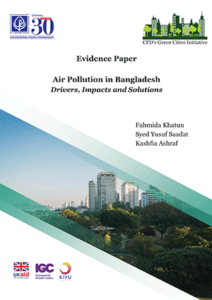 Bangladesh, particularly its capital city Dhaka, has been on the top of the mantle for having the worst air quality in the world. Economic development induced by rapid industrialisation, urbanisation and energy consumption is responsible for the degradation of air quality in major cities of Bangladesh. This imposes huge economic and social cost, along with the burden of diseases when citizens are exposed to poor air for a prolonged period. Key pollutants such as particulate matter (PM2.5 and PM10), sulfur dioxide (SO2), oxides of nitrogen (NOX), ozone (O3), carbon monoxide (CO), and lead (Pb), are responsible for degrading the air quality and imposing substantial threat on human health, environment, and the economy of the country. Effective policies and actions by the government, private sector and other stakeholders are paramount to improve the air quality, and eliminate the threat on human health, environment, and the economy of Bangladesh.
Bangladesh, particularly its capital city Dhaka, has been on the top of the mantle for having the worst air quality in the world. Economic development induced by rapid industrialisation, urbanisation and energy consumption is responsible for the degradation of air quality in major cities of Bangladesh. This imposes huge economic and social cost, along with the burden of diseases when citizens are exposed to poor air for a prolonged period. Key pollutants such as particulate matter (PM2.5 and PM10), sulfur dioxide (SO2), oxides of nitrogen (NOX), ozone (O3), carbon monoxide (CO), and lead (Pb), are responsible for degrading the air quality and imposing substantial threat on human health, environment, and the economy of the country. Effective policies and actions by the government, private sector and other stakeholders are paramount to improve the air quality, and eliminate the threat on human health, environment, and the economy of Bangladesh.
Authors: Fahmida Khatun, Syed Yusuf Saadat and Kashfia Ashraf
Publication period: March 2023


